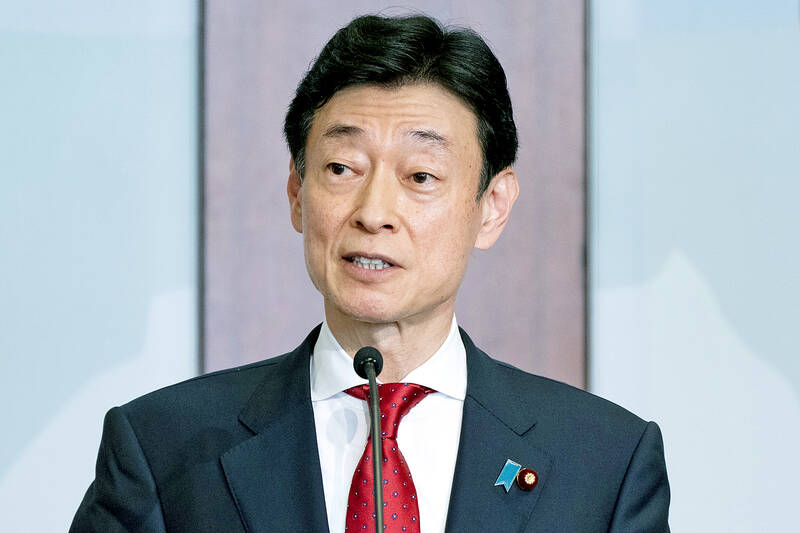Sat, Jan 07, 2023 page1

Japanese Minister of Economy, Trade and Industry Yasutoshi Nishimura speaks at the Center for Strategic and International Studies in Washington on Thursday.
Photo: AP
Japan wants G7 countries to take a coordinated approach this year aimed at preventing the “economic coercion” that China has applied to some of its trading partners.
Actions taken by China in the past few years, such as suspending imports of Taiwanese pineapples and Australian wine, represent a “clear and present danger” for economies around the world, Japanese Minister of Economy, Trade and Industry Yasutoshi Nishimura said in Washington on Thursday.
“We expect effective responses to economic coercion will be a major item at this year’s G7 summit,” he said.
Japan is the rotating head of the G7 industrial democracies this year and is scheduled to host the group’s summit in October.
Nishimura said that “countermeasures” might be necessary to help countries and regions that are the target of restrictive trade practices by authoritarian regimes.
Identifying chokepoints that could be used by such regimes would also be helpful, he added.
China has repeatedly applied economic retribution toward trading partners amid diplomatic disputes. Japan itself saw its imports of rare earths from China — crucial to a number of manufacturing supply chains — affected in 2010 following a maritime incident in contested East China Sea waters.
Beijing has criticized G7 nations for what it says are their own protectionist moves designed to prevent China’s economic rise.
The Chinese Ministry of Foreign Affairs said that export controls on semiconductors imposed by the Washington hurt the global economy and US businesses.
Late last year, China also accused the UK of abusing state power in overturning a chip-factory deal.
Nonetheless, Nishimura indicated his intention to press ahead with such policies in remarks following a meeting with US Secretary of Commerce Gina Raimondo, at which Jiji Press said they discussed cooperation on chip equipment export restrictions.
If Japan proceeds with a plan to restrict local chip equipment companies, including Tokyo Electron Ltd and Nikon Corp, from selling advanced products to Chinese customers, it would mark a major victory for US President Joe Biden’s increasingly aggressive campaign to prevent China from acquiring key foreign technologies.
Nishimura said that democratic powers made a mistake more than two decades ago in assuming that deepening economic interdependence, by bringing China and then Russia into the WTO, would “unquestionably bring about a peaceful world” following the end of the Cold War.
Rather than prosperity helping to build peace, it only increased geopolitical risks as authoritarian governments used growth and advancement to boost their power, Nishimura said.
“The free trade system ended up increasing the legitimacy of authoritarian regimes,” he said. “The illusion we embraced ended up amplifying the threat of hegemonic powers.”
At the same time, there is no way to “turn back the clock,” and a complete economic decoupling is “impossible,” Nishimura said.
He urged greater coordination among free-market democracies on measures including export controls, boosting supply chain resilience and energy security.
He also said that, given how the WTO’s dispute-settlement mechanism is now effectively crippled, Japan, the US, Europe and other like-minded partners need to “work hard on reform of the WTO.”
That would be “one of biggest challenges we need to work toward this year,” he said.
https://www.taipeitimes.com/News/front/archives/2023/01/07/2003792143
No comments:
Post a Comment